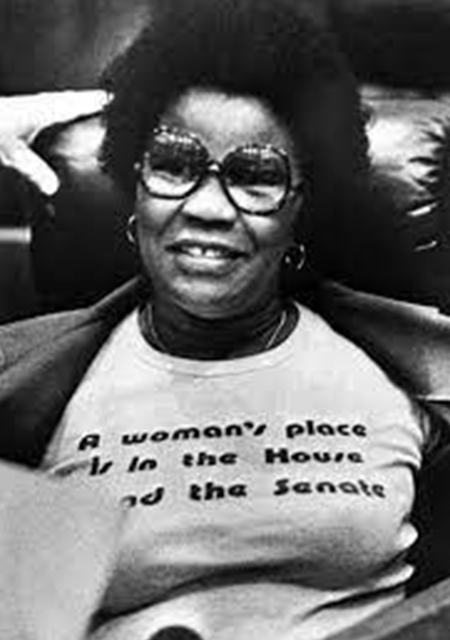Our Namesake: Carrie P. Meek
U.S. Congresswoman Carrie P. Meek enjoyed a historic trailblazing career as a public servant, college administrator, and educator.

Early Life and Education
Born on April 29, 1926, in Tallahassee, Florida, Carrie Pittman Davis Meek was the daughter of sharecroppers Willie and Carrie Pittman and granddaughter of a slave.
Growing up in segregated Tallahassee as the youngest of 12 siblings, she excelled both academically and athletically. Meek attended Florida A&M University (formerly known as Florida A&M College for Negroes), where she not only thrived as an honors student, but also distinguished herself as a star athlete in track and field. During her college years, she became a member of Delta Sigma Theta sorority. In 1946, she graduated with a bachelor's degree in biology and physical education.
During an era when Black individuals were barred from pursuing graduate education in Florida, the state sponsored her tuition to attend graduate school in the northern United States. In 1948, she earned a Master of Science (M.S.) degree in public health and physical education from the University of Michigan, marking the beginning of her journey towards a remarkable career in public service.
Higher Education and Professional Journey
Following her graduation from the University of Michigan, Carrie P. Meek's academic journey began as a teacher at Bethune-Cookman University (formerly Bethune-Cookman College) in Daytona Beach, Florida. Later, she returned to her alma mater, Florida A&M University, where she continued teaching.
In 1961, Meek relocated to Miami, Florida, where her professional contributions expanded to encompass roles as a professor, administrator, and special assistant to the vice president at Miami-Dade Community College (now known as Miami-Dade College).
Meek's impact extended beyond the classroom. She played an instrumental role in the integration efforts. Her dedicated administration and advocacy essentially led to Miami-Dade Community College's desegregation in 1963, marking a significant milestone in pursuing educational equality.

Political career
Carrie P. Meek started her political career in 1979, motivated by a tragic car accident that claimed the life of Gwen Cherry, the first African-American woman legislator in Florida. In a courageous move, Meek entered the special election to fill Cherry’s vacant seat. Her determination paid off when she secured a seat in the Florida House of Representatives. During her tenure as a state representative, Meek made notable contributions, including the introduction of a bill that criminalized stalking, addressing a critical issue in her community. Her service in the House continued until 1982.
Historic State Senate Win
Later that same year, in 1982, Meek pursued a newly established state senate seat in northern Dade County. Her historic win made her the first African-American woman elected to the Florida State Senate. In her role as a state senator, Meek served on the education appropriations subcommittee. Her legislative endeavors resulted in the creation of thousands of affordable rental housing units, addressing a pressing need within the community. After 14 years in the Florida Legislature, Meek would set her sights on a congressional seat in 1992.
In 1992, a court-mandated redistricting plan established congressional seats specifically designed to elect black representatives in accordance with the Voting Rights Act. Meek ran for the 17th district in northern Dade County and successfully secured a seat in the U.S. House of Representatives that year. This historic election made her the first black lawmaker to represent Florida in Congress since the post-civil war reconstruction era.
Meek was a strong advocate for underserved populations. Upon taking office, she directed her efforts toward economic development, healthcare, education, and housing. Meek spearheaded legislation in Congress to enhance Dade County’s transportation infrastructure, airport, and seaport. She also built a new family and childcare center in the northern part of the county.
Carrie P. Meek never lost a race for re-election to the U.S. House of Representatives. However, she decided not to pursue re-election in the 2002 race and officially retired from her House position at the conclusion of her term in January 2003. Following her retirement, her son, Kendrick Meek, ran for her vacated seat and successfully succeeded her.
Later Life & Legacy
Carrie P. Meek enjoyed retired life by returning to Miami-Dade County, where she continued to dedicate her time and service to the Carrie P. Meek Foundation, a non-profit corporation focused on improving the lives of individuals in Miami-Dade County and throughout the broader community of Florida.
Meek was recognized with numerous accolades and distinctions throughout her career. Among her notable honors, she was awarded honorary Doctor of Laws degrees by Florida A&M University, the University of Miami, Barry University, Florida Atlantic University, and Rollins University.
Carrie P. Meek passed away in her home in Miami on November 28, 2021, at the age of 95.



